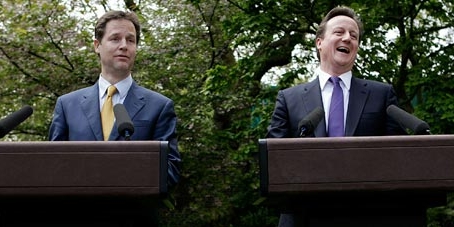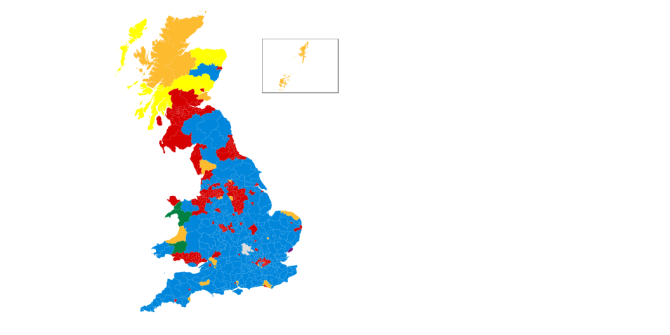 The UK has led the way in the inclusion of out LGBT politicians in Westminster. In this post, Andrew Reynolds presents the findings of a recent report which discusses LGBT candidates and politicians in the context of the upcoming election. You can see a full version of the report here
The UK has led the way in the inclusion of out LGBT politicians in Westminster. In this post, Andrew Reynolds presents the findings of a recent report which discusses LGBT candidates and politicians in the context of the upcoming election. You can see a full version of the report here
Marriage equality was one of the defining issues of the last British parliament, and came at the end of a decade of rapid progress in gay rights both legally and culturally. Arguably, the legalisation of same sex marriage, against significant opposition in his own party, was Prime Minister David Cameron’s finest moment but also a moment that highlighted tensions between generations.
In 2010 Cameron promoted a cadre of modernists MPs which led to more openly gay, lesbian and bisexual Conservative MPs (13) than all other parties. Two out gay Tory MPs ultimately had to beat back de-selection attempts (Crispin Blunt and Nigel Evans).
The representation of gay leaders in public office has come a very long way since Chris Smith’s groundbreaking coming out, when a Labour MP, in 1984. In recent years Britain has led the way in the visible inclusion of out LGBT politicians. Of the 214 out MPs around the world elected since the first, Coos Huijsen in the Netherlands in 1976, Britain has claimed 36 of them. The 26 sitting in the House of Commons at the time of dissolution in April 2015 represented the highest number in the world. On May 8th that number will rise higher. We know these individual stories matter because the descriptive representation of gay people has dramatically effected laws, values and levels of social acceptance – from New Zealand to Nepal, Canada to Colombia – indeed in all 38 countries that have had openly gay members of parliament. In these places, and many others, out elected officials have changed the tone and substance of the debate.[1]
The parliament elected on May 7th will almost certainly have even more out lesbian, gay and bisexual MPs than before – a new record high. There are more out candidates and more in winnable seats. The vast majority of sitting MPs are expected to return to Westminster (only one gay MP stood down in 2015). The new LGBT MPs will cut across party and region, gender and age. However, there will be a pivot from the right to the left. The number of out Tory MPs is likely to decline while the number of gay Labour MPs will probably increase by at least five. We may also see new SNP and Plaid Cymru MPs who happen to be gay. The partisan shift stems from the fact that, unlike five years ago, the Tories are not standing any out gay candidates in safe seats or even winnable marginals. In contrast Labour have one new gay candidate in a safe seat and four in very winnable marginals.
BY PARTY
- Parties and candidates have publically identified 130 out LGBT candidates standing in the general election: 35 Labour, 35 Liberal Democrat, 28 Tory, 22 Green, 5 UKIP, 3 Plaid Cymru, 1 SNP and 1 from the Alliance Party of Northern Ireland.[2]
- At dissolution there were 26 out LGBT MPs in the House: 13 Tories, 9 Labour and 4 Liberal Democrats. We predict 29 out LGBT MPs returned on May 7th- representing 5% of the total seats in the Commons.
- In a switch from the previous parliament, the new House will almost certainly have more Labour LGBT MPs than Tories, and the caucus will be more left leaning than before with likely Scottish Nationalist and Plaid Cymru MPs.
- On the basis of polling evidence (as of April 20th) we predict that two Tories and one Liberal Democrat will lose their seats (one Tory has retired) and that all other incumbent MPs – i.e., 22 in total – will survive.
- We predict they will be joined by seven new LGBT MPs (five Labour, one SNP, and one from Plaid Cymru).
- Our least robust predictions are the SNP (Glasgow South) and Plaid Cymru (Ceredigion) victories and the Lib Dem (St. Austell) and Tory (Pudsey) losses. Plaid have an outside chance of taking Llanelli with an LGBT candidate. While, Labour are mounting a strong challenge in the LGBT Tory seats of Finchley and Milton Keynes South. Nevertheless, with the swings and roundabouts of election day, the prediction of 29 elected LGBT MPs in May 2015 is pretty strong.
- None of the LGBT MPs in serious danger of losing their seats – Conservatives Eric Ollerenshaw (Lancaster), Stuart Andrew (Pudsey), Mike Freer (Finchley) and Iain Stewart (Milton Keynes South), and Lib Dem Stephen Gilbert (St. Austell) – appear to be the victims of overt and sustained homophobia in the campaign. They are likely to be casualties of national swings against their respective parties. Indeed, the Tory incumbent and Labour challenger in Lancaster and Milton Keynes are both openly gay.
BY REGION
- There exists a broad geographical spread in the growth of LGBT MPs and candidates. There are likely to be LGBT MPs from every part of nation except the East of England and Northern Ireland. There could be only the second out MP from Scotland and a doubling of the number of gay MPs in Wales.
- While the highest proportion of constituencies with out candidates is London. Wales is likely to have a higher ratio of LGBT MPs than any other part of the UK.
- The East is by far the most impoverished region of the England with only two, no-hope, candidates
BY IDENTITY
- Out of the 29 MPs predicted to win on May 7th 23 are gay men (79%), three identify as lesbian, two as bisexual men and one as a bisexual woman.
- We don’t have full data on the number of candidates who identify as bisexual, but LGBTQ candidates are overwhelming male (85%). There are sixteen women, only three trans-women and one trans-man.
- Ethnic diversity among LGBT candidates and elected officials is almost non-existent. All the sitting MPs are white, all the predicted MPs elected on May 7 are white, and of the 130 candidates all bar two are white.
CONSTITUENCIES TO WATCH
– Labour’s Cat Smith versus incumbent Tory Eric Ollerenshaw – both LGBT
– incumbent LGBT Tory Stuart Andrew vulnerable to strong Labour challenge
– incumbent LGBT LibDem Stephen Gilbert in a tight race with Tory
– Labour’s Andrew Pakes versus incumbent Tory Iain Stewart – both LGBT
– LGBT Tory MP Mike Freer could lose Thatcher’s old constituency to Labour
– SNP’s Stewart McDonald could overwhelm huge Labour majority
– Plaid Cymru’s Mike Parker could oust sitting Liberal Democrat MP
Notes:
Full data including all candidates and predicted winners in UK 2015 along with details of every out LGBT parliamentarian elected/appointed globally can be found here.
[1]“Representation and Rights: The Impact of LGBT Legislators in Comparative Perspective,” American Political Science Review, Vol.107, No.2 (May 2013) pp.259-274
[2] The SNP and UKIP did not make available a comprehensive list of out LGBT candidates when requested.
This article gives the views of the author, and not the position of the General Election blog, nor of the London School of Economics. Please read our comments policy before posting.
 Andrew Reynolds is a Professor of Political Science at the University of North Carolina, Chapel Hill (USA) and the Director of the UNC LGBT Representation and Rights Research Initiative. His most recent book is The Arab Spring: Pathways of Repression and Reform (with Jason Brownlee and Tarek Masoud) Oxford, 2015. His forthcoming book is: The Children of Harvey Milk (Oxford, 2016).
Andrew Reynolds is a Professor of Political Science at the University of North Carolina, Chapel Hill (USA) and the Director of the UNC LGBT Representation and Rights Research Initiative. His most recent book is The Arab Spring: Pathways of Repression and Reform (with Jason Brownlee and Tarek Masoud) Oxford, 2015. His forthcoming book is: The Children of Harvey Milk (Oxford, 2016).








